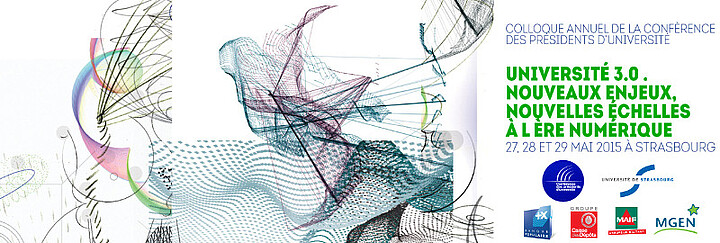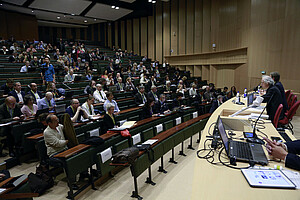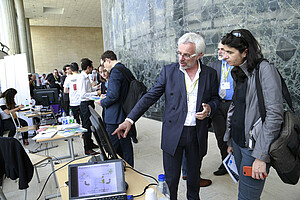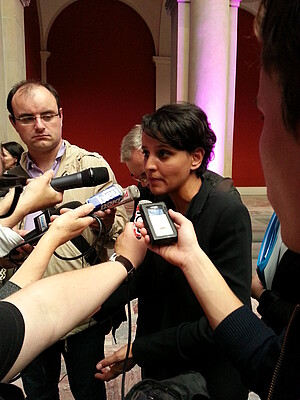Over 300 participants attended the Conference of University Rectors at the University of Strasbourg from 27 to 29 May. The symposium focused on the development of digital practices and their impact on society and on the university.
The official opening of the Conference of University Rectors (CPU) took place on Wednesday, 27 May at the European Council. For this occasion, three French universities were awarded prizes following their participation in the contest "My digital innovation in two minutes".
On Thursday, 28 May, the president of the University of Strasbourg Alain Beretz greeted all the participants at the Cavaillès lecture hall, where he gave details of the digital policy lead by Unistra since 2009. “We aim to support the development of digital practices in less obvious areas,” he explained, giving the example of the Navi-campus app or the virtual campus platform Ever.
The president of the CPU’s digital committee, François Germinet, emphasized the fact that the symposium wasn’t just about digital technology but about the changes brought to society by digital revolutions: “As academic organisations, we are subject to these transformations, which affect our research and teaching practices.” After Bernard Stiegler (head of the Institute for Research and Innovation) made a last statement on the societal challenges linked to digital technologies, workshops started with round-table debates:
- A new public, new educational methods, new trainings, new jobs: what is the impact of digital technologies on traditional models?
- Open science and big data: digital technologies, accelerating creation and the development of knowledge
After the lunch break, a new debate opened the afternoon session:
- The rise of digital technologies and fundamental rights: what practices and ethical guidelines for our data?
The participants then took a walk in the digital village 3.0 composed of 30 stands mostly run by companies who had come to present their products to the higher education leaders attending the conference. A wide range of technological devices were presented: 3D printers, contactless payment systems for students, electronic assessment techniques, etc.
University rectors had the opportunity to test some unusual innovations such as a robot allowing you to interact via video-conference, or to try riding Segway PTs (personal transporters). The University of Strasbourg was represented by the Department of digital practices and the UNERA (the regional academic digital service). They were displaying an innovative device: Navicampus, an app with a GPS guidance system for the visually impaired which was developed by the Faculty of Sport Science, the Department of digital practices and the Student disability service (Mission handicap).
Towards the end of the afternoon, participants worked in groups on four different themes before gathering at the Palais universitaire for a gala evening.
The French Minister of Education, Higher Education and Research Najat Vallaud-Belkacem attended the beginning of the evening. She announced that a call for tender entitled “funding for online continuing education” would be launched soon with a budget of 6 million Euro, and concluded with the statement that “University 3.0 is happening; excellence and equality must remain inseparable throughout life.”
The debates continued on Friday 29 May, with new themes centered on the university environment:
- How does the university anticipate social changes brought by digital technologies?
- What role can the university play in the digital environment?
The symposium ended on a positive note, as the president of the CPU pointed out the « nice organisation, beautiful facilities, a dynamic programme and ‘punchy’ debates”. He also assured that “despite the digital revolution, humans will always be at the heart of the matter : in our activities, technologies transform things but fundamentals always remain.” As a conclusion, he set out the CPU's ten proposals to make universities leading players in the digital world and encouraged the participants to spread the word in their respective institutions.
- Watch the symposium on Unistra's web television
Floriane Andrey & Edern Appéré
Traduction: Camille Frank



















